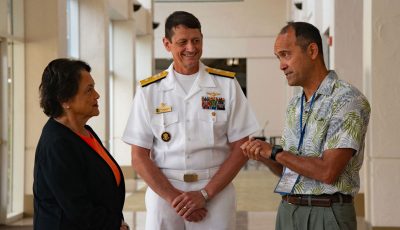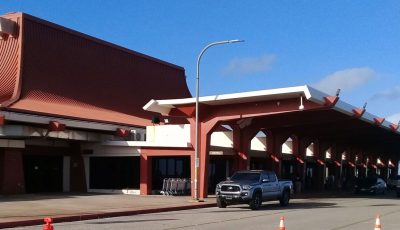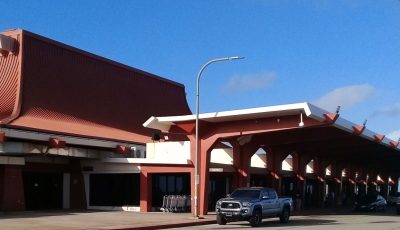CNMI PERSPECTIVES
To the leadership of Tinian and the CPA board of directors
We, the members of the Fanachu Marianas, are hereby expressing our opposition to the military buildup here on Tinian and Pagan for the following reasons:
1. We feel that the “Final Training Needs Assessment: An Assessment of Current Training Ranges and Supporting Facilities in the U.S. Pacific Command Area of Responsibility” published by the Department of the Navy Naval Facilities Engineering Command, Pacific 258 Makalapa Drive, Suite 100 JBPHH HI 96860-3134 on April 2012, Revised March 2013 is insufficient to validate the destruction of Pagan, Tinian and Guam. The report states the following:
• Previous studies have identified training deficiencies within the PACOM AOR; this study confirmed that finding by compiling a list of 62 unfilled requirements.
• The IDA Study examined training capabilities at ranges utilized by the DoD in the PACOM AOR and concluded that current training deficiencies exist, particularly in the Western Pacific.
• Land development and increased housing construction continue to exert pressure on training areas and ranges in the Hawaii Hub. As development near the installations’ boundaries increases, use of maneuver areas and impact areas become affected by noise restrictions. The presence of many protected natural and cultural resources within or adjacent to training ranges and facilities also affect range operations. Light sources in the surrounding communities can preclude some night vision training for air crews. Maritime protective and mitigation measures have resulted in training restrictions that reduce training flexibility, force segmented training, and ultimately reduce training realism. Live-fire ranges near the ocean are required to cease operations when civilian watercraft enter the confines of a range surface danger zone (SDZ) that extends into the ocean behind the impact area. These intermittent cease-fire events disrupt and degrade live-fire training events. Acquisition or expansion of land, airspace, or sea space is difficult for the Services in the Hawaii Hub and has implications for training. For example, at MCBH, insufficient usable land area for range development and lack of Special Use Airspace (SUA) preclude conducting collective training except at the most basic levels on ranges. The urbanized character of Oahu further constrains the development of current Army and Marine Corps ranges. The Army’s PTA and other smaller training areas throughout the Hawaii Hub are limited by the lack of usable terrain. For all Services, SUA expansion is challenged by the present airways structure supporting primarily civilian commercial aviation. Another important aspect of training is the availability of an unimpeded electromagnetic spectrum. Encroachment on the electromagnetic spectrum may cause range users to seek workarounds to complete training that can become unrealistic, segmented, or irrelevant over time.
• All U.S. bases within the Japan Hub are affected by increased urban encroachment that impacts and limits current training operations and opportunities. Urban encroachment produces issues with noise, light, and traffic. Further growth and development of training ranges on Okinawa is severely constrained due to a lack of sufficient buffer zones between U.S. training facilities and surrounding communities.
• The available training areas in the Korea Hub are challenged by encroachment as the civilian population in and around the training areas increases.
2. Furthermore, the military failed to address, in their proposals for increase of danger/hazard surface zones including air space, the emergency evacuation for people needing time-sensitive, critical medical care between Tinian and Saipan.
3. The military failed to address, in the same proposal, the increase in flight time and its natural consequence in increasing airfares and shipping costs between Saipan and Tinian, further isolating direct and immediate access to critically needed materials, supplies, educational opportunities, and other medical/mental health assistance.
4. The military failed to address the economic impact in the increases in prices of goods, products and services by increasing the surface danger zones elongating the transportation duration in and out of Tinian.
5. The military erroneously based their findings on current data without looking into the local government and the people’s long-term goals in stimulating economic development and how the military’s plans will most likely diminish or choke possibilities for achieving a self-sustaining economy.
6. The military failed to provide an adequate and/or realistic and effective mitigation plan to protect our natural environment and wildlife habitats, historical/ancestral sites, limestone forests, and herbal and wild plants.
7. The military failed to adequately address the effects of noise pollution caused by firing ranges and air training on our students at school, the elders, and the entire tranquility of our community and visitors.
8. The military failed to adequately address the needs of our cattlemen, farmers and fishermen in terms of how their proposals affect the size of grazing fields, water (potable and ocean), and the quality of soil and water critical to the healthy growth of organic food, of which is crucial to the health of the people of the CNMI, given that we have reached an endemic level of diabetes, cancer, and other food related diseases in the Pacific region.
9. The DEIS presents the military’s need to restructure and implant their facilities at both our airport and seaport without any regard to the future expansion of this critical infrastructures of the island. The environmental, social, and economic impact at these facilities and surroundings are determined by the military to be insignificant. The military have not taken into consideration the future of the existing plan for expansion and development and growth of our casino/tourism industry and the critical safety issues of co-existing military maneuvers (air and land) and civilian operations and commerce.
10. While the DEIS presented an “economic benefit” to Tinian, these benefits only address (1) the construction period boom; (2) additional construction workers and maintenance of the base (98 employees); (3) population increase (not sure what is the benefit of this) (4) increase GPD; (5) changes in public services (not sure what public services benefits); etc… However, it does not reference any data that these economic benefits are truly realistic. Furthermore, it failed to mention the opportunity costs of restricting expansion of casino/tourism industry, costly travel and transportation between Saipan and Tinian, costs of diminishing the water and natural environmental quality of Tinian, and restriction to cultural and historical sites in the northern part of the island.
11. The DEIS not only reverts the responsibility of their solid waste and wastewater responsibility to the CNMI and municipal government but it also conveys the burden of these waste issue to the community by transporting them to Saipan Solid Waste (Saipan has not even agreed nor were consulted on this mitigation) endangering our oceans and environment by exposing them to contaminants and creating odor pollution in the ports of both Tinian and Saipan.
As elected and leaders of the people, it is incumbent upon you that you participate and let your position be heard on this significant and drastic change to our small community especially during future discussions, meetings, and forums that the people are not afforded the opportunity to voice their concerns. We, your constituents, ask for your assistance in voicing our concerns to the military. We ask that you point out and bring to light the distinctions from what the military has told us they intend to do versus what the DEIS outlines; to draw the line between what has been communicated to what has been written on the DEIS. The integrity of our culture and traditions empowers and motivates the grassroots organizations to fight for what is just. We implore you to express the concerns of the people and we think the majority opposes the military buildup; which we hope will be expressed in the decision-making process for our people. Together, as a unanimous force, we can advocate for the culture and traditions that have given our people (from all walks of life) added value; the culture and traditions that shape our children’s identity, and further a heritage, culture, tradition, people and islands that we can all be proud to call home.
The Inetnun Fanachu Marianas is a newly formed non-profit organization on Tinian.



























